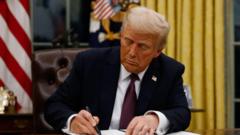Amidst the backdrop of complex political battles and internal strife, President Biden's term concludes next week, revealing a tumultuous narrative characterized by both significant achievements and substantial pitfalls.
Biden's Challenging Presidency: A Journey Marked by Missteps and Legacies

Biden's Challenging Presidency: A Journey Marked by Missteps and Legacies
As Joe Biden reflects on his presidency amid the return of Donald Trump, he grapples with his place in history and the criticism of his administration's handling of unprecedented challenges.
In a poignant eulogy last Thursday at Washington's National Cathedral for former President Jimmy Carter, President Joe Biden stood before a gathering of past presidents—each possessing the validation of re-election that has remained elusive for him. Reflecting on the legacy of a fellow one-term president, Biden remarked on Carter's foresight and contributions to civil rights and international peace.
Biden's presidency is now framed within a challenging context. In a recent interview, he articulated aspirations for how he hopes history will judge his time in office. "I hope that history says that I came in and I had a plan how to restore the economy and reestablish America's leadership in the world," he stated. However, his exit comes as approval ratings slump to an alarming 39%, marking a significant decline from 57% at his term's start.
Next week, Trump will assume office once more, casting a shadow over Biden’s tenure, which is seen as a transition rather than a definitive leadership era. While Biden enacted significant infrastructure and investment legislation, and bolstered NATO alliances, the narrative remains clouded by various crises that undermined his administration's stability.
From the chaotic withdrawal from Afghanistan to unexpected domestic challenges like rising inflation—conditions that were slow to improve despite economic growth—Biden’s leadership has been scrutinized. His administration's early optimism faltered as persistent problems emerged, leading critics to argue that they underestimated the electorate's sentiment.
Consolidating an inner circle comprised of experienced officials, Biden's team had early legislative success with major spending initiatives, including the American Rescue Plan. However, claims have surfaced alleging that a growing insularity within his team stunted the message and responsiveness to pressing national concerns.
As numerous controversies unfolded—including border migration issues and an economic backdrop shaped by inflation spikes—the administration's messaging struggled to resonate effectively with the American public. The sense of urgency among voters contradicted the lengthy timelines of the administration’s policies, which prioritized gradual systemic improvements.
The road ahead for Biden has been riddled with political obstacles, from impeachment inquiries to frustration with messaging. His campaign for a second term amidst these turmoil was marked by an acknowledgement of his age and contemporary political dynamics, forcing a re-evaluation of strategies on multiple fronts.
Further compounding his challenges were crises abroad, including the recent Hamas attack, alongside personal struggles involving his son Hunter, all of which burdened his presidency's public perception.
As elections approach, observers speculate on whether the Biden administration might have benefited from an early transition to a successor, rather than continuing to contest a second term. Ultimately, Biden's memory as president remains entwined with Trump's continued appeal, leaving his administration's legacy susceptible to further scrutiny in the wake of political shifts.
With the intricate tapestry of Biden's presidency nearing its close, the delineation between accomplishment and setback defines the narrative as he readies for the eventual transfer of power—an end, yet also a re-beginning for the political landscape in America.
Biden's presidency is now framed within a challenging context. In a recent interview, he articulated aspirations for how he hopes history will judge his time in office. "I hope that history says that I came in and I had a plan how to restore the economy and reestablish America's leadership in the world," he stated. However, his exit comes as approval ratings slump to an alarming 39%, marking a significant decline from 57% at his term's start.
Next week, Trump will assume office once more, casting a shadow over Biden’s tenure, which is seen as a transition rather than a definitive leadership era. While Biden enacted significant infrastructure and investment legislation, and bolstered NATO alliances, the narrative remains clouded by various crises that undermined his administration's stability.
From the chaotic withdrawal from Afghanistan to unexpected domestic challenges like rising inflation—conditions that were slow to improve despite economic growth—Biden’s leadership has been scrutinized. His administration's early optimism faltered as persistent problems emerged, leading critics to argue that they underestimated the electorate's sentiment.
Consolidating an inner circle comprised of experienced officials, Biden's team had early legislative success with major spending initiatives, including the American Rescue Plan. However, claims have surfaced alleging that a growing insularity within his team stunted the message and responsiveness to pressing national concerns.
As numerous controversies unfolded—including border migration issues and an economic backdrop shaped by inflation spikes—the administration's messaging struggled to resonate effectively with the American public. The sense of urgency among voters contradicted the lengthy timelines of the administration’s policies, which prioritized gradual systemic improvements.
The road ahead for Biden has been riddled with political obstacles, from impeachment inquiries to frustration with messaging. His campaign for a second term amidst these turmoil was marked by an acknowledgement of his age and contemporary political dynamics, forcing a re-evaluation of strategies on multiple fronts.
Further compounding his challenges were crises abroad, including the recent Hamas attack, alongside personal struggles involving his son Hunter, all of which burdened his presidency's public perception.
As elections approach, observers speculate on whether the Biden administration might have benefited from an early transition to a successor, rather than continuing to contest a second term. Ultimately, Biden's memory as president remains entwined with Trump's continued appeal, leaving his administration's legacy susceptible to further scrutiny in the wake of political shifts.
With the intricate tapestry of Biden's presidency nearing its close, the delineation between accomplishment and setback defines the narrative as he readies for the eventual transfer of power—an end, yet also a re-beginning for the political landscape in America.























